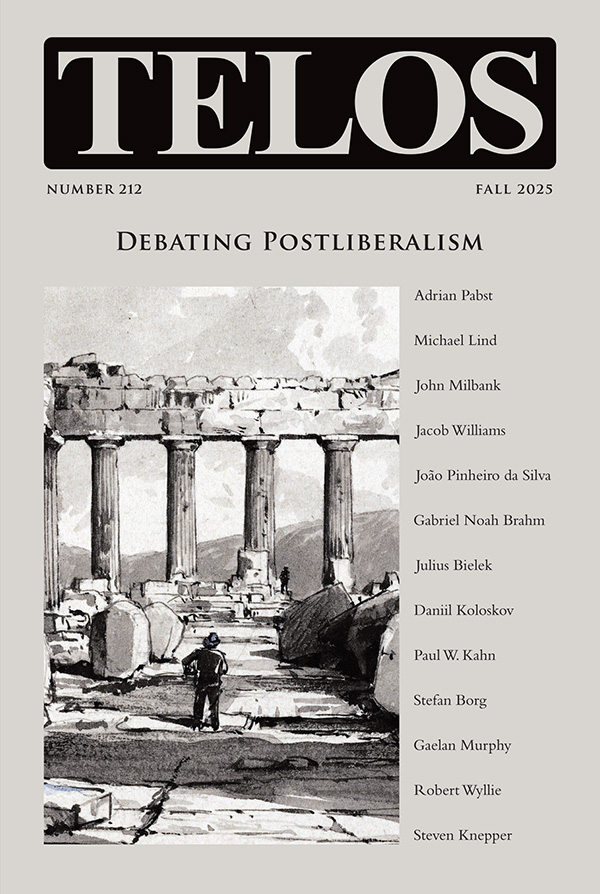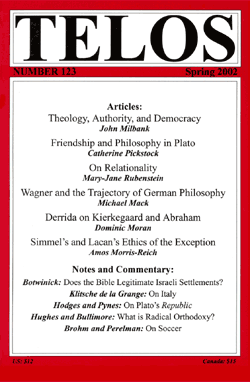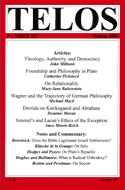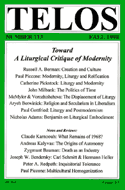By Adrian Pabst · Friday, October 3, 2025 Telos 212 (Fall 2025): Debating Postliberalism is now available for purchase in our store. Individual subscriptions to Telos are also available in both print and online formats.
 In 1998, Alan Wolfe remarked that “the right won the economic war, the left won the cultural war, and the center won the political war.” It was the age of triumphant liberalism, freed from the shackles of the Cold War confrontation between the capitalist West and the Communist East. Capitalism was now the uncontested model, as Western countries increasingly abandoned a more embedded social market economy in favor of the global market-state while emerging market economies embraced the state-market. In each case, society was the loser. Even as countries converged internationally and China morphed into an economic powerhouse, asset and income inequality increased within countries, and so did regional disparities—between the former heartlands of the Rust Belt and the new metropolitan hubs exemplified by Silicon Valley. Building on the writings of Paul Piccone and Christopher Lasch, critics of liberalism such as Christophe Guilluy, Nancy Fraser, Michael Lind, and Quinn Slobodian have highlighted the growing gulf between elite enclaves and peripheral wastelands, or hubs vs. heartlands, but their analysis has mostly been dismissed as nostalgic or downright reactionary. Something similar applies to politicians on both sides of the spectrum who have questioned liberal economics—whether Pat Buchanan in the past or JD Vance and Josh Hawley more recently on the Republican right, or Bernie Sanders, Ro Khanna, and Chris Murphy on the Democratic left. In 1998, Alan Wolfe remarked that “the right won the economic war, the left won the cultural war, and the center won the political war.” It was the age of triumphant liberalism, freed from the shackles of the Cold War confrontation between the capitalist West and the Communist East. Capitalism was now the uncontested model, as Western countries increasingly abandoned a more embedded social market economy in favor of the global market-state while emerging market economies embraced the state-market. In each case, society was the loser. Even as countries converged internationally and China morphed into an economic powerhouse, asset and income inequality increased within countries, and so did regional disparities—between the former heartlands of the Rust Belt and the new metropolitan hubs exemplified by Silicon Valley. Building on the writings of Paul Piccone and Christopher Lasch, critics of liberalism such as Christophe Guilluy, Nancy Fraser, Michael Lind, and Quinn Slobodian have highlighted the growing gulf between elite enclaves and peripheral wastelands, or hubs vs. heartlands, but their analysis has mostly been dismissed as nostalgic or downright reactionary. Something similar applies to politicians on both sides of the spectrum who have questioned liberal economics—whether Pat Buchanan in the past or JD Vance and Josh Hawley more recently on the Republican right, or Bernie Sanders, Ro Khanna, and Chris Murphy on the Democratic left.
Some political and policy differences notwithstanding, the mainstream left and right—in the United States, Europe, and other Western countries such as Japan, South Korea, Australia, and New Zealand—took a progressive turn and embraced untrammeled markets, hyper-individualism, and foreign military adventures. The ruling elites felt vindicated by the “end of history” utopia of a global convergence toward liberal market democracy and the inevitable forward march of globalization. Both liberal interventionists and neoconservative crusaders advanced the vision of America as a liberal Leviathan that secures the social contract at home and U.S. supremacy abroad.
Continue reading →
By Kyle Nicholas · Thursday, October 22, 2015  Mention “Radical Orthodoxy” in a room of people who are either quite intimately or only remotely acquainted with contemporary theology, and one surely will receive equal parts of praise and scorn. Whether it is being praised or scorned, however, it is plain that Radical Orthodoxy has worked its way deep into the fabric of contemporary theological discourse. Since the publication of John Milbank’s Theology and Social Theory in 1992, Catherine Pickstock’s After Writing in 1997, and Radical Orthodoxy: A New Theology, edited by Milbank, Pickstock, and Graham Ward in 1998, the Radical Orthodoxy movement has done what any explosively innovative intellectual movement will do after the hype settles down: mature or wither away. Mention “Radical Orthodoxy” in a room of people who are either quite intimately or only remotely acquainted with contemporary theology, and one surely will receive equal parts of praise and scorn. Whether it is being praised or scorned, however, it is plain that Radical Orthodoxy has worked its way deep into the fabric of contemporary theological discourse. Since the publication of John Milbank’s Theology and Social Theory in 1992, Catherine Pickstock’s After Writing in 1997, and Radical Orthodoxy: A New Theology, edited by Milbank, Pickstock, and Graham Ward in 1998, the Radical Orthodoxy movement has done what any explosively innovative intellectual movement will do after the hype settles down: mature or wither away.
In their article “What is Radical Orthodoxy?” (Telos 123, Spring 2002), John Hughes and Matthew Bullimore map out, in a short space and yet with crisp detail, the main themes in the Radical Orthodoxy project. For those familiar with the movement, their points will not come as a shock: that a deep metaphysical violence underlies modernity, political liberalism, and capitalism; that the philosophical and theological dualisms of modernity must be named and then overcome with the aid of both premodern and postmodern thought; and that in the face of proliferating violence it is Christian orthodoxy—in line with Aquinas, Boethius, Augustine, Gregory of Nyssa, and Iamblichean Neo-Platonism—that presents truly “radical” alternatives to the prevailing political, philosophical, and theological orders.
Continue reading →
By Kyle Nicholas · Tuesday, July 21, 2015  In his article “The Last of the Last: Theology, Authority, and Democracy,” from Telos 123 (Spring 2002), John Milbank argues that theology’s proper role is within the Church extended through time and space, rather than as “‘a public discourse’ answerable to the critical norms and liberal values.” Yet his claim does not come without qualification. Many aspects of theological inquiry that were once held together have splintered since 1300 CE: faith and reason, scripture and tradition, and theology under ecclesial authority, in particular. Here the Church is actually more to blame, both Protestantism and Post-Tridentine Catholicism, than some (fictional) increasingly enlightened and liberated society. In his article “The Last of the Last: Theology, Authority, and Democracy,” from Telos 123 (Spring 2002), John Milbank argues that theology’s proper role is within the Church extended through time and space, rather than as “‘a public discourse’ answerable to the critical norms and liberal values.” Yet his claim does not come without qualification. Many aspects of theological inquiry that were once held together have splintered since 1300 CE: faith and reason, scripture and tradition, and theology under ecclesial authority, in particular. Here the Church is actually more to blame, both Protestantism and Post-Tridentine Catholicism, than some (fictional) increasingly enlightened and liberated society.
Continue reading →
By Kyle Nicholas · Monday, June 22, 2015  Catherine Pickstock’s “Liturgy and Modernity,” from Telos 113 (Fall 1998), is an effort to find an alternative to liberal individualism and social fragmentation in modernity. Pickstock finds this alternative in liturgy: a liturgical critique of modernity where “liturgy” functions as a thoroughly political category. Liturgy is specially equipped to confront modernity due to its nature as ritual behavior (and therefore universal among humans). Yet the liturgical is to be favored over “ritual” for two reasons. First, ritual has already been relegated to its own “delimited sphere” in modernity, where it is viewed as a private superstructural category. Furthermore, ritual in the modern mind is regarded merely as “mechanical repetitions divorced from any informing narrative.” Liturgy, on the other hand, responds to the former challenge by its nature as “a pattern of social action” (not a delimited sphere) and responds to the latter by its foundation in a “privileged transcendent signifier.” Catherine Pickstock’s “Liturgy and Modernity,” from Telos 113 (Fall 1998), is an effort to find an alternative to liberal individualism and social fragmentation in modernity. Pickstock finds this alternative in liturgy: a liturgical critique of modernity where “liturgy” functions as a thoroughly political category. Liturgy is specially equipped to confront modernity due to its nature as ritual behavior (and therefore universal among humans). Yet the liturgical is to be favored over “ritual” for two reasons. First, ritual has already been relegated to its own “delimited sphere” in modernity, where it is viewed as a private superstructural category. Furthermore, ritual in the modern mind is regarded merely as “mechanical repetitions divorced from any informing narrative.” Liturgy, on the other hand, responds to the former challenge by its nature as “a pattern of social action” (not a delimited sphere) and responds to the latter by its foundation in a “privileged transcendent signifier.”
Continue reading →
By Lewis West · Tuesday, October 7, 2014  When Karl Marx described the commodity, he invoked the language of faith. For him, the commodity remained “a very strange thing, abounding in metaphysical subtleties and theological niceties.”[1] Marx, a dedicated secular economist, hesitated to pinpoint the exact power of the commodity. He could not fully understand it without recourse to a mythology he abhorred, one that far predated his radical recasting of accepted historical narratives. Here religion colors economics: the logic of exchange resembles a curious mysticism. When Karl Marx described the commodity, he invoked the language of faith. For him, the commodity remained “a very strange thing, abounding in metaphysical subtleties and theological niceties.”[1] Marx, a dedicated secular economist, hesitated to pinpoint the exact power of the commodity. He could not fully understand it without recourse to a mythology he abhorred, one that far predated his radical recasting of accepted historical narratives. Here religion colors economics: the logic of exchange resembles a curious mysticism.
Continue reading →
By John Milbank and Adrian Pabst · Thursday, August 14, 2014 We agree with Joshua Ralston that all forms of religious fundamentalism demand both universal and unconditional condemnation as well as regional and global responses to help all the victims—irrespective of their faith. We also agree with him that it is wrong to judge age-old religious traditions by modern secular, liberal standards and that essentialized notions distort complex cultural and historical realities.
Continue reading →
|
|
 In 1998, Alan Wolfe remarked that “the right won the economic war, the left won the cultural war, and the center won the political war.” It was the age of triumphant liberalism, freed from the shackles of the Cold War confrontation between the capitalist West and the Communist East. Capitalism was now the uncontested model, as Western countries increasingly abandoned a more embedded social market economy in favor of the global market-state while emerging market economies embraced the state-market. In each case, society was the loser. Even as countries converged internationally and China morphed into an economic powerhouse, asset and income inequality increased within countries, and so did regional disparities—between the former heartlands of the Rust Belt and the new metropolitan hubs exemplified by Silicon Valley. Building on the writings of Paul Piccone and Christopher Lasch, critics of liberalism such as Christophe Guilluy, Nancy Fraser, Michael Lind, and Quinn Slobodian have highlighted the growing gulf between elite enclaves and peripheral wastelands, or hubs vs. heartlands, but their analysis has mostly been dismissed as nostalgic or downright reactionary. Something similar applies to politicians on both sides of the spectrum who have questioned liberal economics—whether Pat Buchanan in the past or JD Vance and Josh Hawley more recently on the Republican right, or Bernie Sanders, Ro Khanna, and Chris Murphy on the Democratic left.
In 1998, Alan Wolfe remarked that “the right won the economic war, the left won the cultural war, and the center won the political war.” It was the age of triumphant liberalism, freed from the shackles of the Cold War confrontation between the capitalist West and the Communist East. Capitalism was now the uncontested model, as Western countries increasingly abandoned a more embedded social market economy in favor of the global market-state while emerging market economies embraced the state-market. In each case, society was the loser. Even as countries converged internationally and China morphed into an economic powerhouse, asset and income inequality increased within countries, and so did regional disparities—between the former heartlands of the Rust Belt and the new metropolitan hubs exemplified by Silicon Valley. Building on the writings of Paul Piccone and Christopher Lasch, critics of liberalism such as Christophe Guilluy, Nancy Fraser, Michael Lind, and Quinn Slobodian have highlighted the growing gulf between elite enclaves and peripheral wastelands, or hubs vs. heartlands, but their analysis has mostly been dismissed as nostalgic or downright reactionary. Something similar applies to politicians on both sides of the spectrum who have questioned liberal economics—whether Pat Buchanan in the past or JD Vance and Josh Hawley more recently on the Republican right, or Bernie Sanders, Ro Khanna, and Chris Murphy on the Democratic left.  Mention “Radical Orthodoxy” in a room of people who are either quite intimately or only remotely acquainted with contemporary theology, and one surely will receive equal parts of praise and scorn. Whether it is being praised or scorned, however, it is plain that Radical Orthodoxy has worked its way deep into the fabric of contemporary theological discourse. Since the publication of John Milbank’s Theology and Social Theory in 1992, Catherine Pickstock’s After Writing in 1997, and Radical Orthodoxy: A New Theology, edited by Milbank, Pickstock, and Graham Ward in 1998, the Radical Orthodoxy movement has done what any explosively innovative intellectual movement will do after the hype settles down: mature or wither away.
Mention “Radical Orthodoxy” in a room of people who are either quite intimately or only remotely acquainted with contemporary theology, and one surely will receive equal parts of praise and scorn. Whether it is being praised or scorned, however, it is plain that Radical Orthodoxy has worked its way deep into the fabric of contemporary theological discourse. Since the publication of John Milbank’s Theology and Social Theory in 1992, Catherine Pickstock’s After Writing in 1997, and Radical Orthodoxy: A New Theology, edited by Milbank, Pickstock, and Graham Ward in 1998, the Radical Orthodoxy movement has done what any explosively innovative intellectual movement will do after the hype settles down: mature or wither away.  In his article “The Last of the Last: Theology, Authority, and Democracy,” from Telos 123 (Spring 2002), John Milbank argues that theology’s proper role is within the Church extended through time and space, rather than as “‘a public discourse’ answerable to the critical norms and liberal values.” Yet his claim does not come without qualification. Many aspects of theological inquiry that were once held together have splintered since 1300 CE: faith and reason, scripture and tradition, and theology under ecclesial authority, in particular. Here the Church is actually more to blame, both Protestantism and Post-Tridentine Catholicism, than some (fictional) increasingly enlightened and liberated society.
In his article “The Last of the Last: Theology, Authority, and Democracy,” from Telos 123 (Spring 2002), John Milbank argues that theology’s proper role is within the Church extended through time and space, rather than as “‘a public discourse’ answerable to the critical norms and liberal values.” Yet his claim does not come without qualification. Many aspects of theological inquiry that were once held together have splintered since 1300 CE: faith and reason, scripture and tradition, and theology under ecclesial authority, in particular. Here the Church is actually more to blame, both Protestantism and Post-Tridentine Catholicism, than some (fictional) increasingly enlightened and liberated society.  Catherine Pickstock’s “Liturgy and Modernity,” from Telos 113 (Fall 1998), is an effort to find an alternative to liberal individualism and social fragmentation in modernity. Pickstock finds this alternative in liturgy: a liturgical critique of modernity where “liturgy” functions as a thoroughly political category. Liturgy is specially equipped to confront modernity due to its nature as ritual behavior (and therefore universal among humans). Yet the liturgical is to be favored over “ritual” for two reasons. First, ritual has already been relegated to its own “delimited sphere” in modernity, where it is viewed as a private superstructural category. Furthermore, ritual in the modern mind is regarded merely as “mechanical repetitions divorced from any informing narrative.” Liturgy, on the other hand, responds to the former challenge by its nature as “a pattern of social action” (not a delimited sphere) and responds to the latter by its foundation in a “privileged transcendent signifier.”
Catherine Pickstock’s “Liturgy and Modernity,” from Telos 113 (Fall 1998), is an effort to find an alternative to liberal individualism and social fragmentation in modernity. Pickstock finds this alternative in liturgy: a liturgical critique of modernity where “liturgy” functions as a thoroughly political category. Liturgy is specially equipped to confront modernity due to its nature as ritual behavior (and therefore universal among humans). Yet the liturgical is to be favored over “ritual” for two reasons. First, ritual has already been relegated to its own “delimited sphere” in modernity, where it is viewed as a private superstructural category. Furthermore, ritual in the modern mind is regarded merely as “mechanical repetitions divorced from any informing narrative.” Liturgy, on the other hand, responds to the former challenge by its nature as “a pattern of social action” (not a delimited sphere) and responds to the latter by its foundation in a “privileged transcendent signifier.” 

